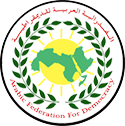|
The Problem:
We in the Arabic Federation for Democracy suppose that the main reason of the political dilemma in the countries of the Arab Spring is that political parties are in hurry to dominate over the authority before the end of the transitional stage without controls, while countries of the Arab Spring are not considered as democratic so political parties are not committed to democratic mechanisms as well the logic of majority and minority. The transitional stage isn’t the stage of competition over authority or legacy but a stage of establishing a new political construction aiming at reducing dispute, controlling competition and reforming the circumstance. Consequently, it requires harmony, offering compromises for the achievement of stability and security, unifying individuals for specifying the prior strategies and issues, strengthening national front against internal and external plots and building independent neutral national institutions away from the competition of the parties guided by the public will, and the mentioned factors represent the essence of democracy.
Conflict over governance randomly and without controls has created a gap between political systems and peoples due to the absence of national thought and realistic methodologies, the decrease the level of prospects, the domination of partisan electoral thinking and weakness of the national united identity. Accordingly, they have resulted in the prevalence of partisan interests, a defect in vision toward the state and the lack of enhancement for concepts of citizenship and neutrality of management within citizens. It should be mentioned that it is unexpected in the short-term that any entity will control over the authority then hand it over voluntarily in the Arabic countries and whosoever waits for a peaceful deliberation of authority will wait for a long time.
Countries of the Arab spring have been managed mysteriously and secretively, while peoples weren’t informed honestly about the truth of circumstances and neither an obvious realistic program nor a specific roadmap was presented for them for the transitional stage including: a delay in setting the time of elections, appointments in the same way like the government was formed and controversial unexplained positions, decisions, events and relationships in addition to the absence of accountability and independent investigation committees. All these factors have contributed to the loss of assurance, opening the door for doubt and rumors and harmed credibility and confusion leading to additional division and crises between political parties based on contradictions.
So, the main task of the Arabic Federation for Democracy is to assist supporters of democracy and reform in the Middle East and North Africa (MENA) region in their efforts and endeavors for building strong intuitions in order to represent citizens in the best way and to enhance the culture of accountability and transparency, correspond with civil activists, parliaments, governments and parties.
Because of the continuous change within regional political situation in the few years and citizens’ insistence to make change, it has become necessary to have an institution aiming at unifying energies and efforts so as to accomplish the desired change.
It is worth mentioning that the program of the federation is designed in a way to respond to the field political variations on one hand, and to contribute to the development of civil groups, parliaments and governing institutions in the long term on the other hand. In addition, the federation doesn’t only takes into consideration the efficient participation of women and youth within political processes, but also seeks to promote plural political systems through enhancing democratic institutions, preserving elections and supporting larger civil involvement.
The federation looks for giving opportunities for political leaders and civilians in the Arab counties after the revolution by exchanging ideas and learnt lessons with leaders in the countries that have passed through transitional periods toward democracy. Within the coming months, the federation will seek to draw out practical advice from the experience of other countries so as to identify how to establish the political frameworks necessary for facilitating transition from the dominant governance. The federation declares that the construction of networks among reformers having similar ideas signifies a fundamental element in building the necessary mobilization for making change in the region, besides the importance to supply them with needed opportunities for exchanging experiences and enhancing structures which support the promotion of democratic governance principles in their countries, through arranging multi-partisan elections, establishing independent legislative authorities, guaranteeing public voting and fostering an active civil society.
As a result, the federation recognizes the movement of civil society organizations working in the issues of democracy and concerned with changing the Arabic status quo and the enhancement of the concepts of freedom and democracy as well as respect of human rights need a strong push to encourage its endeavors to achieve the desired goals, support its capacities, develop relations among them, modify connections with the countries and its concerned institutions and control the form of relations with international institutions. And the importance of enhancing institutional capacity for civil society organizations is represented through raising the performance of employees in it, benefitting and learning from the advanced experiences in this field and increasing openness of the Arab League to civil society organizations in line with the establishment of Civil Society Commission in the Arab League and the decisions of the last Arabic summit in Kuwait.
|


